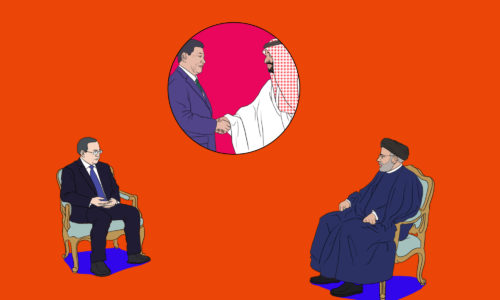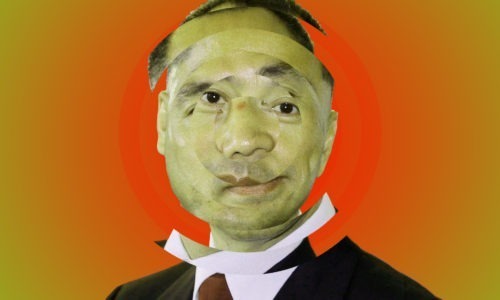Who is Guo Wengui?
An exiled billionaire on a mission: Is he a narcissist, a revolutionary, or just a man with an ax to grind?
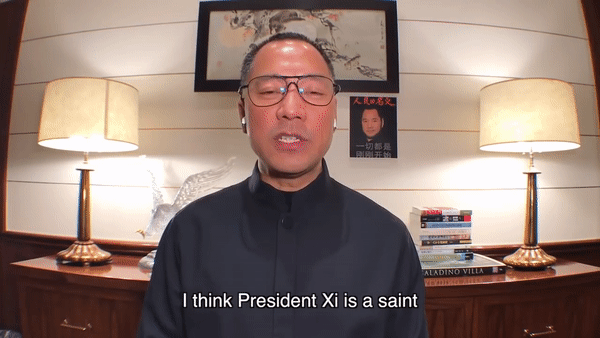
In March this year, an exiled Chinese real estate tycoon named Guo Wengui 郭文贵 set off to do what few could: expose the shadowy world of elite Chinese politics for everyone to see. Who is he, and how much of what he says can we believe?
The mysterious Pangu Plaza
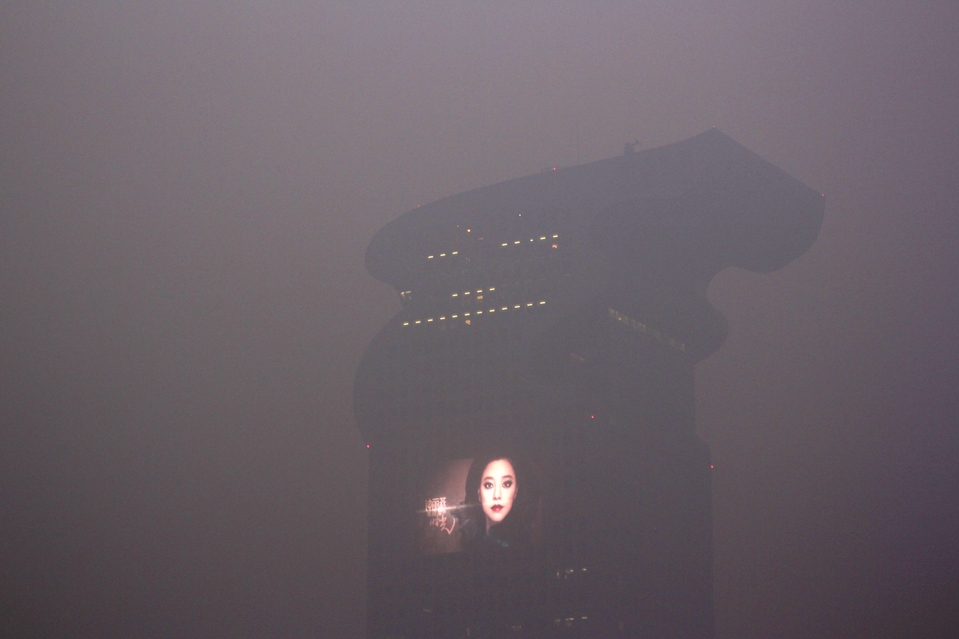
Although Guo himself remained behind the scenes, one of his companies’ projects first came to international prominence in 2008: Pangu Plaza — a skyscraper shaped like a dragon’s head, boasting a “seven-star” hotel, apartments, offices, a shopping mall, and a “courtyard in the sky.” The building also features a massive exterior TV screen displaying advertisements — on smoggy days, Pangu Plaza invites comparison with the film Blade Runner. More importantly, Pangu Plaza occupies an enormous patch of land right next to Beijing’s Olympic green with its Bird’s Nest stadium and Water Cube aquatic sports venue.
Pangu Plaza opened just before the Olympics, and the developers did their utmost to benefit from the Olympic aura. There were also rumors that, according to a 2008 New York Times report (paywall), “Bill Gates paid $17 million to rent one of the high-rise courtyard apartments for a single year; that Warren Buffett and Henry Kissinger have been lounging there; and that the building complex is somehow part of the Olympic Games.” The Times also said that “oddly…neither the shopping mall nor the seven-star hotel opened in time for the Games,” and noted the “complex history” of the “mysterious building”: In 2006, “Liu Zhihua 刘志华, a vice mayor of Beijing and one of the officials in charge of Olympic-related construction projects, was sacked for corruption… Pangu Plaza was one of the Olympic-related projects in his portfolio.”
Guo’s name remained out of the news in 2008, but in retrospect, you might see his influence in the spin surrounding Pangu Plaza: the Trumpish showmanship (seven-star luxury, so classy!), the rumors and half-truths, the opaque nature of the business, and the whiff of corrupt political connections.
“The power hunter”
Fast-forward to 2015. Caixin, a respected Chinese business magazine (and — disclosure — a The China Project partner), published an investigative report (in Chinese) on Guo, chronicling a shady history, and calling him a “power hunter” (权力猎手 quánlì lièshǒu), whose real talent was navigating the murky world between business and elite politics, and developing a powerful network of political patrons, which helped him accumulate huge amounts of wealth and power. The article also characterized him as a gambler and brawler, who has often made ruthless and risky power plays against his enemies.
Sometime before or after the Caixin story was published, Guo seems to have gone into self-imposed exile in New York. He remained quiet and out of the public eye until late January 2017, when the South China Morning Post reported:
Guo Wengui, the controlling shareholder in Beijing Zenith Holdings and Beijing Pangu Investment, appeared in a video interview last Thursday on Mingjing, an overseas Chinese political rumors website.
The original video on Mingjing seems to have subsequently disappeared, but it heralded the start of a political campaign of a kind never before seen in mainland Chinese politics.
Guo the showman and his allegations
Soon after the Mingjing video was published, Guo took to Twitter (in Chinese), where his cover image is a Photoshop of him in Hunger Games getup. He also has a YouTube page (in Chinese). Starting in February, Guo became a prolific user of the social media platforms. Wearing flashy suits, and posing in his $68 million New York apartment overlooking Central Park, beside a huge bonfire on a beach, or on his exercise machine, Guo urges his growing number of followers to work out, and he frequently promises in a portentous tone, “Everything has just begun” (一切都是刚刚开始 yīqiè dōu shì gānggāng kāishǐ).
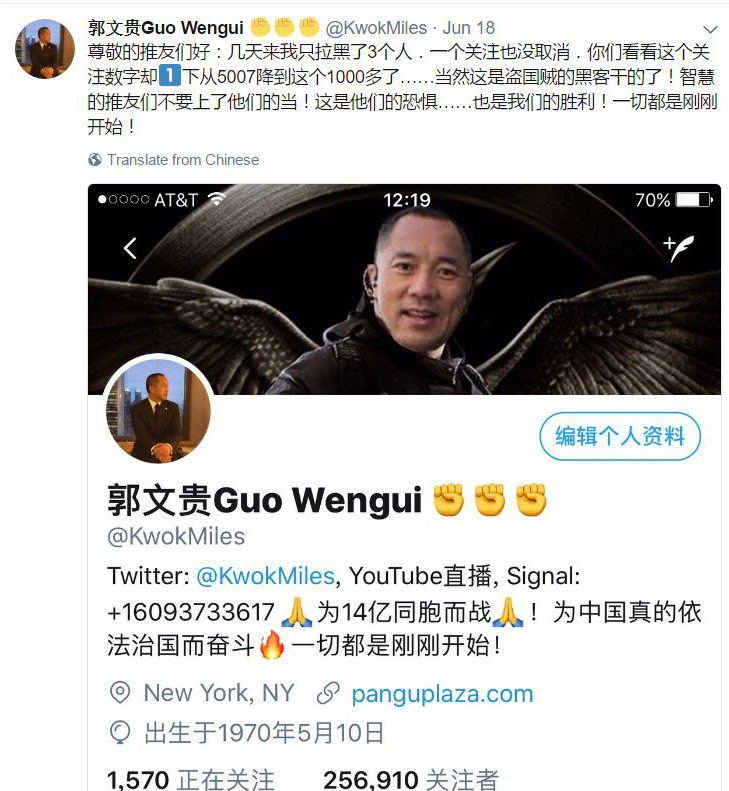
By mid-May, Guo had let loose a number of serious accusations against Chinese Communist Party leaders. He claimed that the nephew of China’s top graft buster, Wang Qishan 王岐山, is secretly invested in HNA Group, a major Hong Kong-based aviation conglomerate. He also alleged (paywall) that Wang’s predecessor, He Guoqiang 贺国强, owns a shell company that is the second-largest stakeholder in Founder Securities, a company Guo sought and failed to acquire.
His stated goal is to vanquish the “thieves who plunder the nation” (盗国贼 dào guózéi), and he seems to be trying to sow chaos in the lead up to the 19th Party Congress this fall, when the new Party leadership committee will be selected. He has told contradictory stories and tales that journalists have found to be false. He has tweeted what he claims were the identity documents of a relative of Wang Qishan, which internet users found belonged to a different person who happened to have the same name.
Guo is, at best, an unreliable witness to the corruption he claims he can document. But his career as a high-flying real estate developer required him to build a large network of corrupt officials who helped him, and there’s enough truth in some of his statements that make him a subject of fascination around dinner tables from Beijing to San Francisco, and a target of the Chinese government.
The Chinese Ministry of Public Security appealed to Interpol to arrest Guo. State media launched what the South China Morning Post called an “unprecedented international publicity war” against him, comprising an “unusually savvy media and cyberspace campaign at home and abroad” to discredit him and stop his public announcements.
Where did this turbulent tycoon come from?
Portrait of the tycoon as a young man
Chinese state media have used many details from the Caixin investigation to smear Guo, but that doesn’t mean that the story is untrue. While claiming his money is “clean,” Guo admitted in a Voice of America interview in April that he had a close relationship with security officials, paying for rentals, private jets, surveillance equipment, and other costs, in exchange for favors.
Guo’s place of origin has been a topic of much speculation within Chinese media. His numerous identification cards and passports — he claims he holds 12 passports in total — offer conflicting answers: Heilongjiang, Zhengzhou, Hong Kong. Some accounts have him as the son of an ordinary family with no money or connections, others say he has relatives high up in the People’s Liberation Army (PLA).
According to the Yangtze Times (in Chinese), Guo hails from a small village in Shandong Province and never graduated from junior high school. Whether or not that’s true, Guo appeared to have acquired an early taste for bending the law. In 1989, Guo and his brother were busted for an oil sale fraud. One story says that police killed his brother after he attacked an officer. Guo Wengui himself was arrested and served time in jail. He has later claimed that he was arrested for handing out money to student protesters in the spring of 1989.
By the early 1990s, Guo was out of jail and beginning to make a name for himself in the rough-and-tumble provincial capital of Zhengzhou, where he climbed the rungs of a Henan-based furniture company and started courting Hong Kong money. In 1993, Guo combined his company’s assets with an investment from a Hong Kong businessman to found a real estate firm, Yuda Real Estate, and broke ground on Zhengzhou’s first high-rise, the Yuda International Trade Center, in the heart of Zhengzhou’s business district. At 45 stories, the building juts above the city’s drab, industrial skyline. It captures both Guo’s most distinct traits as a real estate developer — his penchant for eye-catching structures that exude power and luxury and his laxness with money. The Yuda International, largely funded by dubious loans, ran 1 billion yuan over budget. Within a few years, the debt collectors were closing in and Guo fled the country for the first time. During his first exile, his brother was killed by creditors, according to some accounts (other versions of the story have his brother killed in 1989 when they were doing their oil scam).

It’s not clear how long Guo stayed away from China, but by the time Beijing was awarded the Olympic Games in 2001, he was plotting his second act. And despite having lost his fortune, Guo had kept the asset that mattered most: his political connections. While in Zhengzhou, he had cultivated a close relationship with the city’s Party secretary at the time, Wang Youjie 王有杰. The Yuda International, as the Chinese media would later note, sits less than 100 meters from the railway state and municipal government, and not far from the city’s airport. Such a great address was hardly luck. After the Yuda International’s completion, Wang Youjie’s son was appointed to the board of Guo’s company, which had been acquired by a Hong Kong firm. As would become clear during Wang’s trial for corruption in 2007, the former Party secretary used his son’s seat on Guo’s company board to hide money in Yuda real estate projects. At around this time, Guo also got to know then state security vice-minister Ma Jian 马建, who became his political patron. Ma’s power in the surveillance and security apparatus gave Guo a frightening set of tools to use against his enemies.
Sex tapes and an Olympic land grab
In 2002, a company Guo controlled, Zenith Holdings Ltd., bought up land north of Beijng’s Fourth Ring Road, which the city government had designated to be the site of the 2008 Beijing Olympics. The upcoming Games had set off a development frenzy, and Guo had secured prime real estate in a hot market. On an especially valuable plot, a long, narrow strip parallel to the Water Cube Olympic aquatic venue, and a mere 500 meters from the Bird’s Nest stadium, Guo planned a series of high-rises shaped like an elongated Chinese dragon.
The project quickly ran into problems. First, city officials decided the tower forming the dragon’s back was an eyesore, forcing Guo to revise his original design. Then, shortly after breaking ground, a conflict with the construction company brought construction to a halt, leading to a full funding crisis. In August 2004, the Ministry of Land and Resources threatened to revoke Guo’s property rights, since he had failed to finish paying for the land he was building on. Within a year, the city had moved to seize the land, even though the main structure of Guo’s to-be dragon, a hotel and apartment building, was near completion.
After a failed lawsuit in the Beijing courts to halt the land seizure, Guo appealed directly to the one authority that could reverse his fortunes — Liu Zhihua 刘志华, the vice mayor of Beijing, who oversaw construction projects for the upcoming Olympics. By all accounts, their meeting was amicable, but Liu was firm: The city would not rethink its decision. The municipal government was worried that Guo’s financing problems meant the project would not be finished before the 2008 Olympics, leaving an eyesore right next to the main competition venues.
Liu had other considerations as well. Guo’s development project was on coveted land. That May, the city government placed Guo’s property up for bid, and within six months, it was bought on the cheap by two companies closely associated with Liu.
Backed into a corner, Guo responded with the combination of ruthlessness and treachery that would become his calling card.
Using his connections with the security services, he hired investigators to follow Liu and unearth his secrets. Guo soon reported Liu for corruption and circulated a 60-minute video of Liu having sex with his mistress in Hong Kong, captured on a hidden camera in Liu’s hotel room. The tape made its way to the Party leadership. They were furious. This was not what the Party had promised when it said that the preparation for those Olympics would be the “cleanest in history.” Liu was arrested and stripped of all his posts in June 2006. Within a month, Guo had regained property rights to his development project and Pangu Plaza was back on track for completion in time for the Olympics.
The Pangu Society
The fall of Liu Zhihua was Beijing’s tightly interwoven business and political community’s introduction to Guo Wengui. “Guo was friendly and welcoming,” people who knew him told Caixin, “but underneath his warm first impression, he was cruel and ruthless.” And with state security vice-minister Ma Jian at his side, Guo feared no one. The tycoon and the spymaster had reportedly developed a mutually beneficial working relationship, whereby Guo funneled millions in bribes and gifts in exchange for Ma’s clout over the domestic security apparatus.
When Guo’s dragon-shaped luxury complex, now named Pangu Plaza, opened in 2008 before the Olympics, Guo used it to deepen his network of powerful connections. Pangu Plaza was a one-stop shop to befriend, incentivize, and if necessary compromise top officials. Guo would reportedly wine and dine his targets during weekly banquets at his hotel. Those pliable enough he showered with luxury goods and high-end prostitutes, encounters with which he reportedly would film on cameras hidden in his hotel rooms.
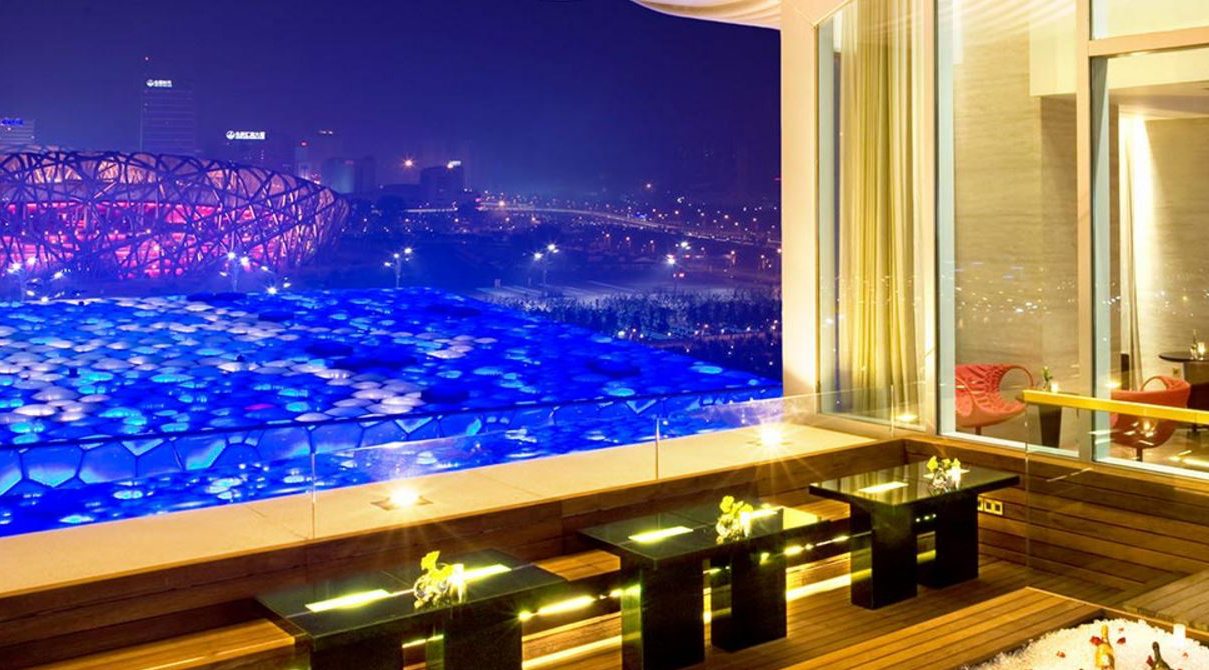
Whatever devious means he used, powerful people appeared to trust Guo. He apparently developed a close relationship with Zhang Yue 张越, the head of Hebei’s Political and Legal Affairs Committee, which controls the police force of the province that surrounds Beijing. Guo also befriended then president Hu Jintao’s 胡锦涛 right-hand man, Ling Jihua 令计划, who would be felled in 2014 when his son crashed his Ferrari with two undressed women, killing himself and one of the women.
Guo’s extensive network became known as the “Pangu Society” (盘古会 pángǔ huì). His political contacts, and especially his relationship with Ma Jian, returned large dividends. It did not matter whether his ventures were financially solvent, made bad investments, or reneged on loans. The logic of business simply did not apply as long as Guo had friends in powerful places. A bad loan could vanish from his company books, as one loan (in Chinese) of 320 million yuan ($46.8 million) from the Agriculture Bank of China did in 2010. Guo also had a second development project near the Olympic Park, which he withdrew from amid financial difficulty. The project was strangely transferred back to Guo’s holding company after it became profitable.
“How can two hedgehogs be friends?”
By 2009, Guo began diversifying his portfolio beyond real estate. His friends in high places reportedly helped him acquire shares of the security brokerage firm Minzu Securities on the cheap.
The scope of Guo’s influence was impressive. Through Ma Jian and Zhang Yue, Guo convinced and cajoled various state-owned entities, including Shijiazhuang Commercial Bank, Beijing SASAC, and Beijing Capital Airport Holding Company, to sell shares to Guo’s holding company below market price. When Capital Airport Holding Group — which operates the Beijing Capital Airport — refused to sell shares to Minzu at a discount, the company’s CEO mysteriously ended up resigning and being detained. Shortly afterward, Capital Airport Group sold its shares. By 2011, Guo owned over 80 percent of Minzu Securities, effectively making him the sole controlling stakeholder.
Around this time, Qu Long 曲龙, a former business partner, whom Chinese media has described as Guo’s “number one henchman,” had a falling out with Guo over a business dispute, and reported him to the Central Commission for Discipline Inspection. Qu had hoped to topple Guo by detailing his use of kickbacks and political favors to acquire publicly traded stocks. Instead, Qu’s report landed him in jail with a 15-year sentence for embezzlement in Hebei Province, the stronghold of Zhang Yue.
Guo’s purchase of Minzu Securities, however, created other problems. He had accumulated a considerable amount of debt during his buying spree. In addition, Minzu was cash strapped and Guo had no capital to invest in the firm. In the spring of 2014, he struck a deal with a major technology conglomerate, Founder Group. Founder would capitalize Minzu, using shares of Guo’s Zenith Holdings as collateral, and then acquire and merge Minzu with subsidiary Founder Securities. The deal was underpinned by Guo’s good rapport with Founder Group chief executive Li You 李友, whom Guo had reportedly known since his days in Zhengzhou.
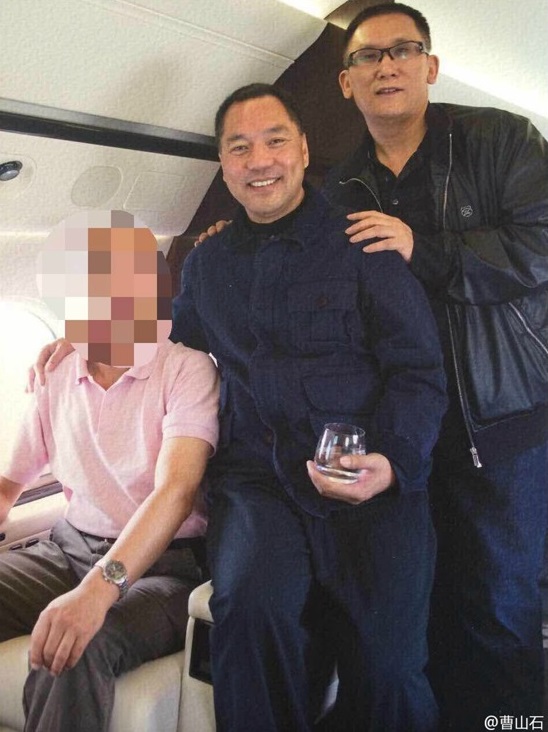
Yet Guo’s business relationship with Li You quickly soured after the merger. A feud erupted between the two partners over how big of a say Guo would get in Founder’s business. Zenith Holdings, which was now Founder Security’s second-largest stockholder, requested five seats on the board of Founder Securities and the right to name a number of executives, which Founder executives rebuffed. “We will give you four seats, but don’t even think about power over operations,” they allegedly said. Guo had obviously seen selling Minzu to Founder as a way to increase his influence, not limit it. Founder, however, saw Guo’s position in a different light.
Attempts to settle the dispute quickly become acrimonious. By the fall of 2014, the two companies were publicly airing grievances. Relations between Guo and Li were prickly. Zenith publicly accused Li of embezzling money and manipulating stock shares. Describing the two squabbling business moguls, one insider source, quoted by Caixin, asked, “How can two hedgehogs be friends?”
Guo’s solution was to drive out Li. Before dawn on December 19, police — likely associated with Ma Jian or another of Guo’s patrons — raided a hotel near the gate of Peking University, where Founder executives had gathered. A security detail protecting the Founder executives fended off the police as Li You escaped in his pajamas. For the international press, which picked up on the incident, the scene of a business tycoon’s praetorian guard battling corruption investigators seemed to perfectly epitomize Xi Jinping’s corruption drive. Days later, Li was arrested and paraded before the camera.
However, Guo’s gamble did not play out as expected this time. Before being arrested, Li had reported Guo and Ma Jian to corruption investigators. On January 16, authorities announced that Ma Jian had been arrested and placed under investigation for corruption. A number of his associates and relatives were also arrested. Sensing his political network unraveling, Guo fled the country for his third and final time. A humbled Ma Jian later appeared in a televised confession to describe several of Guo’s alleged crimes.
In March 2015, Caixin published an in-depth exposé of Guo. The magazine’s editor, Hu Shuli 胡舒立, is well known for pushing the envelope on investigations of corruption and bad government policies — although, as a well-connected political insider, Hu knows how far she can push without getting in trouble. In publishing the investigation, which chronicled Guo’s corruption in painstaking detail since his time in Zhengzhou, Caixin seemed to be sending a message on behalf of the Party: Guo was done.
A permanent irritant?
What led to Guo Wengui’s downfall?
If Guo’s new allegation that senior Party official He Guoqiang was secretly the second-biggest shareholder of Founder Securities is true, then Guo and his allies might have been against a far more powerful force than they suspected. Guo’s defeat, then, is simply the story of a corrupt businessman being squashed by a more powerful, but equally corrupt, senior official.
However, there’s a larger narrative at work, too. Guo’s style of influence peddling suited the era of President Hu Jintao, when corruption — by most accounts — was out of control. By March 2013, Xi Jinping had become president and unleashed an anti-corruption campaign that was rattling the halls of government. Corruption — at least, the type that is pervasive and visible to the public — had no place in Xi’s China, and Guo and Ma Jian were likely candidates to get stamped out. Nor were they the only ones. In the months after Li’s and Ma’s arrest, a number of other Founder executives were also arrested or taken away to “assist with investigations.” In November 2016, Li and other former executives were charged with insider trading, hiding financial information, and obstructing official business. Zhang Yue was also investigated and found guilty of corruption.
But the anti-corruption investigators have not yet turned on themselves: Despite Guo’s best efforts, Wang Qishan does not appear to be under investigation, and there does not seem to be any kind of renewed campaign against so-called “red princelings,” the children of veteran communist leaders, whom Guo says are “plundering the nation.” But Guo’s reemergence in New York is a reminder that there are many secrets lurking in China’s corridors of power. And whether his motive is simply revenge, or if he really believes he can help unseat the Communist Party and return to China, Guo is likely to be an irritant to Xi Jinping and his Politburo for some time to come.
